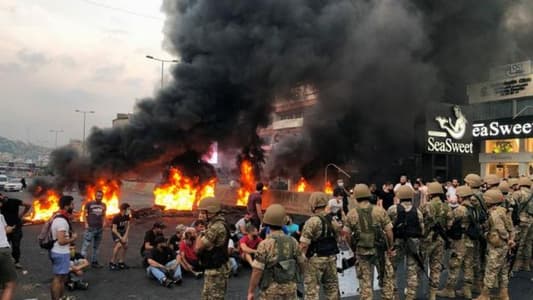Thousands of protesters blocked roads and burned tires across Lebanon for a second day on Friday, demanding the demise of a political elite they say looted the economy to the point of breakdown.
The nationwide protests, Lebanon’s biggest in years, brought ordinary people from all sects and walks of life to the streets. They carried banners and chanted slogans calling on the government to resign.
“We came to the streets because we can no longer bear this situation. This regime is totally corrupt,” said Fadi Issa, 51, who marching with his son. “They are all thieves, they come to the government to fill their pockets, not to serve the country.”
“We don’t want just a resignation. We want them (leaders) be held accountable. They should return all the money they stole. We want change,” he added.
A video circulated on social media showed protesters in the Chouf mountains burning a large poster of President Michel Aoun, yelling in unison “come on get out and leave”. Across the country, protesters chanted against the country’s top leaders including Hariri and Parliament Speaker Nabih Berri.
Demonstrators had gathered outside the government headquarters in central Beirut on Thursday evening, forcing the cabinet to backtrack on plans to impose a new fee on WhatsApp voice calls. Police fired tear gas as they clashed with some demonstrators overnight.
People blocked roads in the north, the south and the capital on Friday. Schools and businesses were closed. “The people want the downfall of the regime,” protesters near the government’s Serail headquarters chanted.
The unrest prompted Hariri to cancel a cabinet meeting due on Friday to discuss the 2020 draft budget. He is set to make a speech instead.
Fires in the street of central Beirut were smoldering on Friday. Pavements were scattered with the glass of several smashed shop-fronts and billboards had been torn down.
Christian politician Samir Geagea and Druze leader Walid Jumblatt, whose parties both have some ministers in the coalition cabinet, have called on the government to resign.
Seeking ways to boost revenues, a government minister on Thursday announced plans to raise a new fee of 20 cents per day for calls via voice over internet protocol (VoIP), used by applications including Facebook-owned WhatsApp.
But as the protests spread, Telecoms Minister Mohamed Choucair revoked the proposed levy.






TWEET YOUR COMMENT